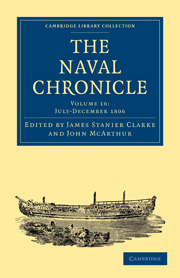 The Naval Chronicle
The Naval Chronicle Book contents
- Frontmatter
- PREFACE TO THE SIXTEENTH VOLUME
- PLATES IN VOLUME XVI. From Original Designs
- BIOGRAPHICAL MEMOIR OF THE LATE CAPTAIN ROBERT FAULKNOR, TO WHOSE MEMORY HIS COUNTRY HAS VOTED A MONUMENT IN ST. PAUL'S. Preceded by an Account of his Naval Ancestors, from the year 1695
- BIOGRAPHICAL MEMOIR OF THE LATE SIR ANDREW MITCHELL, K.B. ADMIRAL OF THE BLUE SQUADRON
- BIOGRAPHICAL MEMOIR OF SIR THOMAS LOUIS, BART. K.M.T. AND K.S.F. REAR-ADMIRAL OF THE WHITE SQUADRON
- BIOGRAPHICAL MEMOIR OF SIR HOME RIGGS POPHAM, K.M, AND F.R.S. COMMODORE OF HIS MAJESTY'S SQUADRON AT THE CAPTURE OF BUENOS AYRES, &C
- BIOGRAPHICAL MEMOIR OF THE LATE SIR JOHN LEAKE, KNT. ADMIRAL OF THE FLEET, &C
- INDEX
BIOGRAPHICAL MEMOIR OF THE LATE CAPTAIN ROBERT FAULKNOR, TO WHOSE MEMORY HIS COUNTRY HAS VOTED A MONUMENT IN ST. PAUL'S. Preceded by an Account of his Naval Ancestors, from the year 1695
Published online by Cambridge University Press: 10 January 2011
- Frontmatter
- PREFACE TO THE SIXTEENTH VOLUME
- PLATES IN VOLUME XVI. From Original Designs
- BIOGRAPHICAL MEMOIR OF THE LATE CAPTAIN ROBERT FAULKNOR, TO WHOSE MEMORY HIS COUNTRY HAS VOTED A MONUMENT IN ST. PAUL'S. Preceded by an Account of his Naval Ancestors, from the year 1695
- BIOGRAPHICAL MEMOIR OF THE LATE SIR ANDREW MITCHELL, K.B. ADMIRAL OF THE BLUE SQUADRON
- BIOGRAPHICAL MEMOIR OF SIR THOMAS LOUIS, BART. K.M.T. AND K.S.F. REAR-ADMIRAL OF THE WHITE SQUADRON
- BIOGRAPHICAL MEMOIR OF SIR HOME RIGGS POPHAM, K.M, AND F.R.S. COMMODORE OF HIS MAJESTY'S SQUADRON AT THE CAPTURE OF BUENOS AYRES, &C
- BIOGRAPHICAL MEMOIR OF THE LATE SIR JOHN LEAKE, KNT. ADMIRAL OF THE FLEET, &C
- INDEX
Summary
Call To Remembrance What Acts Our Fathers Did In Their Time; So Shall Ye Receive Great Honour, And An Everlasting Name!
The name of Faulknor, which has descended from an ancient family in Hampshire, claims a pre-eminence in the naval history of the British Isles. From the close of the seventeenth century, and as it would appear even previous to that time, it has uniformly adorned the list of our Admiralty: and it is to be hoped, that whenever this honourable Board shall be pleased to abandon the blasphemous deities and monsters of Pagan history, and the names of brutes, for some titles more in character with the patriotism and heroic valour of the British Navy, they will select other names, besides that of our ever to be lamented Hero, Admiral Lord Nelson, wherewith to denominate the wooden bulwarks of our country.
(I.) Our first attention is directed to Captain Faulknor's great grandfather, William Faulknor, Esq., who, so early as the year 1695, appears as fourth Lieutenant of the Royal William. On the 17th of March, 1707, he was advanced to the rank of Captain, with the command of the Torbay. He was afterwards removed into a frigate; and, in 1715, was appointed to the Cumberland, of 80 guns, under the flag of Admiral Sir J. Norris, commander of the Baltic fleet. In 1720 he commanded the Sandwich, of 90 guns, on the same station, and under the same Admiral.
- Type
- Chapter
- Information
- The Naval ChronicleContaining a General and Biographical History of the Royal Navy of the United Kingdom with a Variety of Original Papers on Nautical Subjects, pp. 1 - 88Publisher: Cambridge University PressPrint publication year: 2010First published in: 1806


